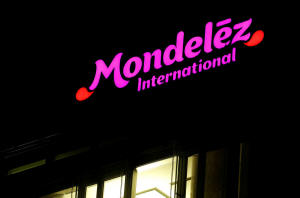Mondelez 'singled out' in boycott over Russia business-memo
 Send a link to a friend
Send a link to a friend
 [June 17, 2023] NEW
YORK (Reuters) - Mondelez International's Europe president said Thursday
that the Milka chocolate bar-maker was being "singled out and treated
differently" from rival companies that are also continuing to sell food
and drinks in Russia, according to a memo seen by Reuters. [June 17, 2023] NEW
YORK (Reuters) - Mondelez International's Europe president said Thursday
that the Milka chocolate bar-maker was being "singled out and treated
differently" from rival companies that are also continuing to sell food
and drinks in Russia, according to a memo seen by Reuters.
In the memo titled "A note on Nordics/Russia" sent to employees
Thursday, Vinzenz Gruber wrote about the boycotts initiated against
Mondelez by Scandinavian companies over its decision to remain in Russia
where it is legally permitted to operate. He described the pressure in
the Nordics as "challenging," and that he was "deeply saddened by what's
happening" to its brands there. Marabou is popular in Sweden, and Freia
is Norwegian.
"It is hard for all of us to see our company singled out and treated
differently from other peers despite the realities of the situation,"
Gruber said in the memo, which was distributed internally at Mondelez.
"If you look in most kitchen cupboards, you will see many products from
food and beverage companies that have not exited Russia." Gruber didn't
refer to any specific brands.
"If there were boycotts on all brands that have parent companies with
activity in Russia, there would be a food supply issue," Gruber said,
without specifying any brands.

The boycotts, initiated by companies including airline SAS, began last
week in Sweden and Norway. The backlash stemmed from Ukraine's National
Agency for the Prevention of Corruption naming Mondelez an
"international sponsor of war" last month for continuing to sell its
goods in Russia. Mondelez did not comment on the designation.
It is not entirely uncommon for companies to boycott another company.
For example, hundreds stopped advertising on Facebook, now Meta, in 2020
after U.S. civil rights groups enlisted multinationals to pressure the
company into taking concrete steps to block hate speech.
After boycotts of Mondelez's Freia and Marabou chocolate brands in the
Nordic region this week the company said on Thursday that it was working
to make its business in Russia stand-alone with a "self-sufficient
supply chain" before the end of the year. The company did not supply
details on its plans for Russia. Food does not fall under any
international sanctions.
As Putin's war enters its second year, companies that continue to
operate in Russia after its invasion of Ukraine have drawn criticism
from human rights groups, customers, employees and investors, according
to numerous media accounts.
A representative at the Russian Embassy in Washington, D.C. did not
immediately respond to a request for comment.
Mondelez did not immediately respond to requests for comment on the
memo. Mondelez rivals in chocolate including Nestle still operate in
Russia as do many other consumer products companies. Nestle said in its
latest annual report that it had six factories in Russia including
confectionary. Nestle didn't respond to requests for comment.

[to top of second column] |

The logo of Mondelez International is
seen on an office building in the Glattpark district in Opfikon,
Switzerland October 2, 2018. REUTERS/Arnd Wiegmann

Mondelez pledged March 9, after the invasion, it was "scaling back"
non-essential activities in the country and focusing on "basic
offerings." On Thursday, Mondelez said it has "scaled down our
activities, discontinuing new capital investment, new product
launches and our advertising media spending in Russia."
But it has continued business in Russia and boosted shipments of
some of its products to the country, customs data covering from
January 1, 2021 through March 31, 2023 shows.
Shipments to Russia of products with descriptions that specifically
mention Milka chocolate bars rose 131% to 22.4 million kilograms in
the year after the war, starting in April 2022 through the end of
March, from 9.7 million kilograms in the prior 12 months, according
to records Reuters obtained from a commercial provider of customs
data.
Shipments of all Mondelez products to Russia jumped to 45 million
kilograms from 28.7 million kilograms in the same time periods,
according to the data.
A Mondelez spokeswoman, contacted multiple times, did not comment on
the customs data.
In a statement, Mondelez said that since January, the company's
overall volumes in Russia have "declined double digits," and both
its import volumes and market share have significantly decreased.
The company did not provide further details on the figures. It also
said it does not disclose country-level sales, import and export
data.
Mondelez also said Thursday it was continuing to reduce its
activities in Russia and expects further volume and sales declines.

So far, Mondelez's Russian business has been more profitable in
recent months than in the past because the company suspended
advertising in the country, a cost savings, and increased prices,
according to an April filing with the U.S. Securities and Exchange
Commission (SEC) covering the first three months of 2023. Currency
changes also helped the business, the quarterly SEC filing shows.
Jan Kæraa Rasmussen, head of environmental, social and governance (ESG)
and sustainability at Mondelez investor PensionDanmark, said the
Danish pension fund considers the "downscaling of their business in
Russia a progression.
"We see potential for further steps from the company," Rasmussen
said. "We are skeptical about the need for most companies to be
present in Russia and encourage them to reconsider their operations
in the country."
(Reporting by Jessica DiNapoli in New York; Additional reporting by
Maurice Tamman and Terje Solsvik; Editing by Anna Driver)
[© 2023 Thomson Reuters. All rights
reserved.]
This material may not be published,
broadcast, rewritten or redistributed.
Thompson Reuters is solely responsible for this content. |